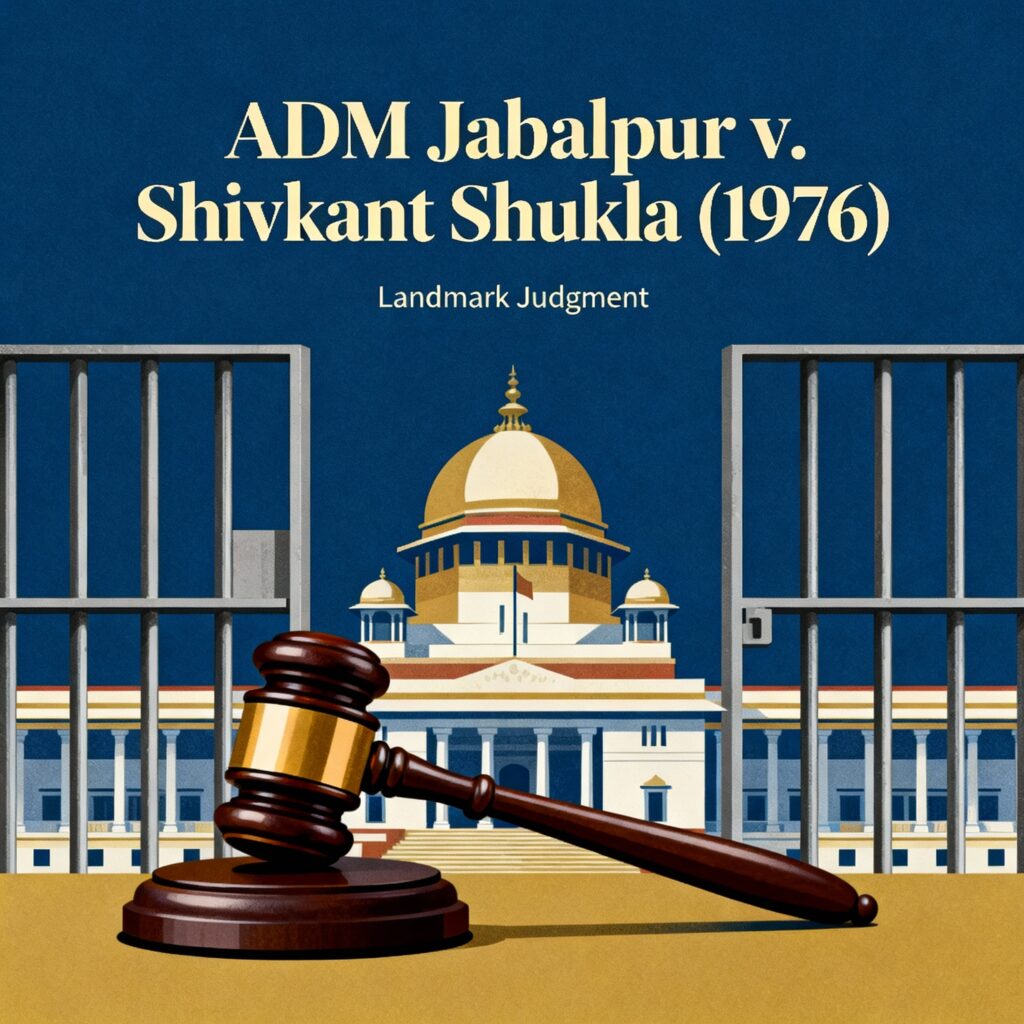Published on 24th August 2025
Authored By: Riddhi Nilesh Joshi
Kirit P Mehta School of Law, NMIMS
|
Aspect |
Details |
|
Court |
Supreme Court of India |
|
Date |
9 April 1957 |
|
Citation |
AIR 1957 SC 699; [1957] INSC 33 |
|
Bench |
Chief Justice S.R. Das; Justices P.B. Gajendragadkar, B.P. Sinha, S.K. Das & T.L. Venkatarama Aiyyar reddit.com+13manupatracademy.com+13indiankanoon.org+13scribd.com+2latestlaws.com+2legalvidhiya.com+2 |
|
Statutes Involved |
Bombay Lotteries & Prize Competitions Control & Tax Act, 1948 and Amendment Act, 1952; Constitution of India—Arts. 245, 246, 276(2), 301, List II Entries 26, 34, 60, 62; Articles 19(1)(g), 301, 304(b) . |
Facts
The petitioners/respondents (RMDC) were promoters of a prize-competition business run via Sporting Star, a weekly published and printed in Bangalore. Their crossword contest attracted entries from across India, including a large volume from Bombay. To facilitate participation, they established collection agents in Bombay who received entry forms and fees from local participants. These entries were forwarded to Bangalore, where the winners were declared and prizes awarded.
The Maharashtra (then Bombay) Legislature, seeking to regulate such activities, amended the Bombay Lotteries and Prize Competitions Control and Tax Act, 1948, in 1952. The amendment:
Expanded the definition of “prize competition” to include contests originating outside the state but operating within Bombay through distribution and collection channels;
Introduced Section 12A, which imposed a tax on gross receipts from such competitions conducted within Bombay, even if the content was printed elsewhere.
RMDC already paid taxes and held a license under the Mysore law (since 1949), with net profits around 5% after costs and taxes. They contended that Bombay’s law imposed a duplicative and extraterritorial burden, violating the federal structure. They approached the Bombay High Court, which agreed that the provisions were unconstitutional, though the Division Bench based this decision on different reasoning.
Issues
- Whether Bombay had legislative competence to tax and regulate prize competitions printed outside but circulated inside its territory (territorial nexus, extraterritoriality)?
- Whether the amended Act was concerned with “betting and gambling” (Entry 34/62) or general trade (Entry 26/60)?
- Did the amendments violate constitutionally guaranteed fundamental rights:
- Article 19(1)(g): freedom of trade, commerce & profession?
- Article 301: freedom of inter-state trade?
- And could restrictions be saved under Article 19(6) / 304(b)?
- Whether a crossword contest was gambling or a skill-based competition?
Contentions
State of Bombay (Appellant)
- Competent legislature to legislate on “betting & gambling” (Entry 34) and tax thereon (Entry 62), as well as on trade (Entry 26; 60).
- The tax is on a gambling activity—prize competition.
- No violation of Article 19(1)(g) or 301: this is not protected trade, but gambling.
- The Act is not extraterritorial—the tax is on activity within the State
RMDC (Respondents)
- The contests involved skill; thus, not gambling or lottery.
- They already paid licence and tax in Mysore; Bombay’s law impairs extraterritorial effect.
- The contest is a trade/business protected under Article 19(1)(g); restrictions aren’t reasonable.
- Violation of Article 301 as they couldn’t freely trade across State borders.
Decision by Supreme Court
The Supreme Court allowed Bombay’s appeal, overturning the High Court and affirming the amendment Acts. The decision addressed each issue:
Legislative Competence & Territorial Nexus
Bombay was competent under Entry 34 (betting & gambling) and Entry 62 (tax on gambling).
The tax is on gross receipts from entries collected within Bombay—the “territorial nexus” test is satisfied: RMDC utilised deposit boxes, agents, advertising, and money collection in Bombay. Those activities occurred inside the State, triggering the tax.
Nature of “Prize Competitions”
If a competition has significant elements of chance, it’s gambling; not all crossword puzzles are purely skill-based.
RMDC’s contest had enough chance that it fell within gambling definitions.
Thus, falls under Entry 34/62—allowing Bombay to legislate and tax accordingly .
Fundamental Rights
Article 19(1)(g): Freedom to pursue trade is protected except for those activities outside constitutional trade commerce scope. Gambling is “extra commercium”—excluded from protected trade.
Article 301: Freedom of inter-State trade also excludes gambling.
Restrictions need not meet Articles 19(6) / 304(b) because these protections don’t apply to activities outside constitutional scope.
Hence, no violation, and no need to assess “reasonable restrictions.”
Extra temporality
The Act does not reach into other States’ domains: it only taxes entries received within the State.
The “printing place” is irrelevant; nexus is based on targeted business operations.
Thus, the Act is intra vires and not extraterritorial .
Ratio Decidendi
The judgment laid down three core principles:
- Territorial Nexus Doctrine: A state may validly impose taxes or regulatory obligations on activities occurring within its jurisdiction, even if some elements of the business originate outside the state.
- Extra Commercium Principle: Activities involving substantial chance (like gambling and prize competitions) are excluded from the constitutional guarantee of trade freedoms. These are not considered legitimate commerce and hence enjoy no protection under Article 19(1)(g) or Article 301.
- Legislative Competence Based on Pith and Substance: Even if a law incidentally affects trade or commerce, if its primary purpose lies within a valid legislative field (such as betting/gambling), it remains intra vires.
These doctrines collectively shielded Bombay’s legislation from constitutional challenge.
Obiter Dicta
Acknowledged the historical and moral stance against gambling, which has consistently been viewed by Indian society and lawmakers as a socially harmful activity. The Court recognized that while such activities might be structured as commercial enterprises, their inherent vice and societal risks justified distinct legislative treatment.
Reinforced the doctrine that courts must look beyond legal form and technical structure to assess the true nature or substance of a transaction. It emphasized that constitutional validity is determined not by how cleverly an activity is packaged, but by its real-world effect and dominant characteristics.
Highlighted the pith-and-substance doctrine, stating that even if a law incidentally affects another subject within a different legislative list (e.g., trade or commerce), it can still be valid if its primary object and true nature fall within the enacting legislature’s competence. Here, although the law touched upon inter-State trade, its dominant purpose was to regulate gambling, which falls squarely within the State List.
The Court also observed that the freedoms under Article 19(1)(g) and Article 301 are not absolute, and that not all economic activities can claim constitutional protection merely by being labeled as “business.” Activities like gambling, even when lucrative and widespread, cannot elevate themselves to constitutionally protected commerce due to their potential for harm and social disruption.
It further emphasized that public policy considerations may justify stronger restrictions or even prohibitions on certain trades, particularly when they conflict with the overall moral and social welfare objectives of the Constitution. The judiciary, while interpreting rights, must align constitutional freedoms with larger societal interests, especially where public health, ethics, and morality are concerned.
Final Decision
The Supreme Court unanimously validated Bombay’s amendments.
The High Court’s judgment was set aside; RMDC must comply with Bombay’s licensing and taxation regime.
Significance
|
Doctrine |
Emerging Principles |
|
Territorial nexus |
Real business activities in the taxing State justify tax. |
|
Extra-commercium |
Gambling is not protected trade/commercial activity. |
|
Legislative competence |
States can tax gambling under List II entries. |
|
Pith & substance |
Substantive nature of legislation prevails over incidental effects. |
|
Fundamental rights limit |
Trade/commerce protections don’t extend to gambling. |
The ruling in Chamarbaugwala continues to shape Indian jurisprudence on regulatory federalism, commerce vs. morality, and the outer limits of fundamental rights in economic domains. The case is regularly cited in judgments addressing:
- State taxation of digital lotteries and online gaming;
- Overlap of state regulations and inter-state commercial ventures;
- The interpretation of “public interest” in tax and trade restrictions.
This decision also plays a pivotal role in defining the moral underpinnings of constitutional freedoms. It firmly establishes that not all economic activity is constitutionally equal—a principle still invoked in debates over narcotics, betting, and other morally contentious industries.
In academic and judicial circles, the case is hailed as a model of judicial restraint and coherent federal reasoning, ensuring that business innovation does not override legislative intent or public morality.
Further Observations
Courts must analyze actual business operations against constitutional lists—not just where printing or production occurs.
RMDC serves as a major reference on territorial nexus and constitutional taxation authority, later cited in many state taxation and gambling regulation cases.
Conclusion
The State of Bombay v. R.M.D. Chamarbaugwala decision is a constitutional landmark that deftly balances legislative power, federalism, and the limits of economic freedom. The Supreme Court decisively held that gambling and chance-based competitions do not enjoy the same constitutional protection as legitimate trade or commerce. By doing so, the Court firmly established the doctrine that certain activities—though economically structured—are “res extra commercium” and therefore lie outside the ambit of Article 19(1)(g) and Article 301.
Further, the judgment is significant for cementing the territorial nexus doctrine—affirming that states can legislate and tax entities operating from outside their borders, so long as there exists a real and substantial connection to the territory. The Court adopted a pragmatic, purposive approach, focusing on the substance of economic activity, rather than its form or geographical origin.
This case has since become a cornerstone for constitutional interpretation involving:
- State taxation powers,
- The regulation of gambling,
- The limits of commercial freedoms, and
- The reach of State jurisdiction in a federal setup.
Ultimately, Chamarbaugwala serves as a cautionary precedent for businesses that attempt to bypass local laws through technicalities and cross-jurisdictional operations. It remains a vital precedent in Indian public law jurisprudence, especially on how the Constitution demarcates protected economic rights from those deemed socially or morally undesirable.
References
- State of Bombay v RMD Chamarbaugwala AIR 1957 SC 699
- Indian Kanoon, ‘State of Bombay v. RMD Chamarbaugwala’ https://indiankanoon.org/doc/1664422/
- Latest Laws, ‘State of Bombay v RMD Chamarbaugwala (1957)’ https://www.latestlaws.com/latest-caselaw/1957/april/1957-latest-caselaw-33-sc/
- iPleaders, ‘State of Bombay vs R.M.D.C. (1957)’ (iPleaders Blog, 13 April 2021) https://blog.ipleaders.in/state-of-bombay-vs-r-m-d-c-1957/
- Legal Vidhiya, ‘The State of Bombay v R.M.D. Chamarbaugwala’ (Legal Vidhiya, 5 July 2023) https://legalvidhiya.com/the-state-of-bombay-vs-r-m-d-chamarbaugwala-on-9-april1957/
- Legal Vidhiya, ‘State of Bombay v R.M.D.C. AIR 1957 SC 699’ (Legal Vidhiya) https://legalvidhiya.com/state-of-bombay-v-r-m-d-c-air-1957-sc-699/
- io, ‘The State of Bombay v R.M.D. Chamarbaugwala – Case Summary’ https://lawfyi.io/the-state-of-bombay-vs-r-m-d-chamarbaugwala-on-9-april-1957-case-summary/
- Manupatra Academy, ‘MANU/SC/0019/1957: State of Bombay v R.M.D. Chamarbaugwala’ https://www.manupatracademy.com/legalpost/manu-sc-0019-1957




